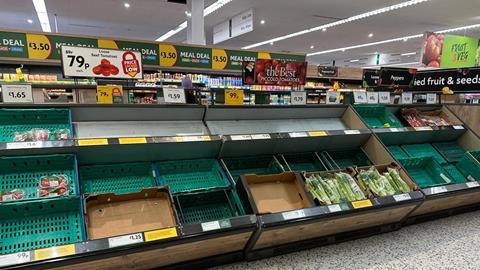GSCOP expert and former senior Asda buyer Ged Futter says the current supply shortages at UK supermarkets are down in large part to retailers’ all-consuming focus on price at the expense of product availability
There are no reports of shortages in France and Germany, and European shoppers have shared photos of fully stocked fresh produce aisles. The same cannot be said of British supermarkets.
The truth behind this contrasting situation is not difficult to find, even when hidden by statements blaming it all on the weather. Yes, the weather is a factor, but it is only one of the factors. The fact of the matter is UK retailers hedged their bets last year. They bet that they wouldn’t need to use UK greenhouses for produce in January and February, yet again they put all their money on black and it landed on red.
I don’t want to be seen as constantly bashing supermarkets. I want to highlight that over and over again they are making the wrong calls, and this is affecting the whole industry. The fight for the lowest price has meant that the wrong metrics are measured. Supermarket buyers are being told ‘you can’t accept any more inflation’, ‘you can’t put your prices up’ and then their finance departments are telling them ‘you must hit your profit numbers, missing is not an option’.
Are buyers being measured on availability? The number one job of a buyer is to make sure that you have stock on shelf. It is your job to navigate choppy waters, to foresee potential issues, to always have an alternative in place. Having an alternative is page one of the buyer handbook – if you don’t have something, can you get it? If you can, how easy is it? Will it take weeks, months or years? You have to know the answer in case the unexpected happens. By the way, as a buyer page two of your handbook is to expect the unexpected.
Retailers in the UK have had a model for years based on annual contracts – fixed prices negotiated and then held, regardless of what happens. This is fine if, during that period, inflation is either non-existent or at 1-2 per cent. But what happens when inflation is running at 10 per cent, 15 per cent, or, heaven forbid, 35 per cent? Are producers, farmers and suppliers expected to swallow this, to absorb it into their already wafer-thin margins? According to the retailers, the answer is yes.
But those days are gone. I think the apt phrase is ‘the salad days are over’. We are lurching from crisis to crisis, and nothing is changing. The focus on price is all consuming and is clouding judgement.
Limiting customers to two or three items is fine if stock is available, but it is completely useless if the shelves are empty. The stock isn’t crossing the Channel at the moment, but don’t worry: according to the BRC, ‘supermarkets are adept at managing supply chain issues and are working with farmers to ensure customers are able to access a wide range of fresh produce’.
Are they really adept at managing supply chain issues? They are masters at creating them; I’m not sure that they are adept at managing them. They are working with farmers? Which farmers? Not the producers in the Lea Valley that is for sure. If they were, then more greenhouses would have young plants in them rather than standing empty.
Shooting yourself in the foot is one thing, but doing it repeatedly is just stupid.
Ged Futter is a director at The Retail Mind, a groceries retail consultancy that aims to improve relationships between retailers and suppliers. It shows businesses what it is like to be a retailer, putting suppliers in their shoes, and then demonstrating the best approaches to working with them. Prior to this Futter was a director at the Groceries Supply Code of Practice (GSCOP) and a senior buying manger in grocery and then frozen foods at Asda.




